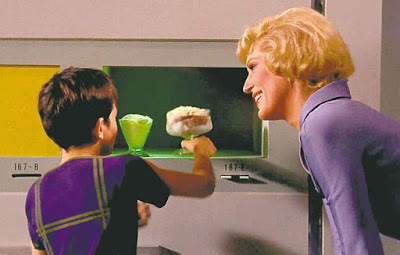- inarguably great dittys that continue to stand the test of time
- symbolic of a pathetic attempt to live in the past
01. Taxman (Take 11) - The Beatles (2:31)
02. I Talk to the Wind - King Crimson (6:08) 1969
03. In a Broken Dream - Python Lee Jackson (3:39) 1970
04. One Monkey Don't Stop No Show - Honey Cone (3:45) 1971
05. Hurting Each Other - Carpenters (2:48) 1971
06. Watching the River Flow - Bob Dylan (3:34) 1971
07. Chapel of Love - Bette Midler (2:43) 1972
08. When My Baby's Beside Me - Big Star (3:22) 1972
09. Comic Book Heroes - I'm Your Superman - Rick Springfield (3:39) 1973
10. Sister Mary Elephant - Cheech & Chong (3:34) 1973
11. Wild Tales - Graham Nash (2:13) 1973
12. Who Do You Think You Are - Jigsaw (2:57) 1974
13. To Each His Own - Faith, Hope & Charity (5:18) 1975
14. Howzat! - Sherbet (3:45) 1976
15. Hold On - Ian Gomm (2:59) 1978
16. Rock Lobster (DB Records version) - The B-52's (4:38) 1978
17. Kitty - Racey (3:21) 1979
18. Fish Heads - Barnes & Barnes (2:25) 1980
19. Eaten by the Monster of Love - Sparks (2:59) 1982
20. Earthquake Song - The Little Girls (2:38) 1983
21. The Real End - Rickie Lee Jones (5:02) 1984
22. Sgt Pepper's Lonely Hearts Club Band (Reprise) - A Day in the Life - Big Daddy (4:56) 1992
Track #4: You know your singing group is lackluster when you have to hire an outside singer (Rod Stewart) to have a hit.
Track #9: A great pair of interlocked tracks from Springfield's second studio album, 1973's Comic Book Heroes. Whenever I listen, I'd swear that the second part, "I'm Your Superman," is like half a musical step lower than the guitar intro track.
Track #13: This is not only a fun disco song -- of which there are very few, in my opinion -- but a fine statement of human rights and free thoughts
The best of business, In the line of business, Is to mind your business --
So mind your business, If you got no business, Then make it your business
To leave other people's business alone!
To each his own, that's my philosophy!
Track #17: This song is of course, the original from which Toni Basil fashioned her version, "Mickey."
Track #18: You know that half of Barnes & Barnes is Bill Mumy, the sci-fi star?
Track #22: From 1992, the wonderful conceit of the band Big Daddy's Sgt Pepper's is that it's performed by a 1950s doo-wop band that has just escaped from a media-free captivity for several decades. Each song on this frabjous album is performed in a various 1950s pop trope. The melding of the album's final song with Buddy Holly's legend is super-stupendous.
https://www.filefactory.com/file/ce9j4b5bo1c/MA-83.rar
Thanks to all, and I'll see you on Monday with more exciting news from Book Land!
























